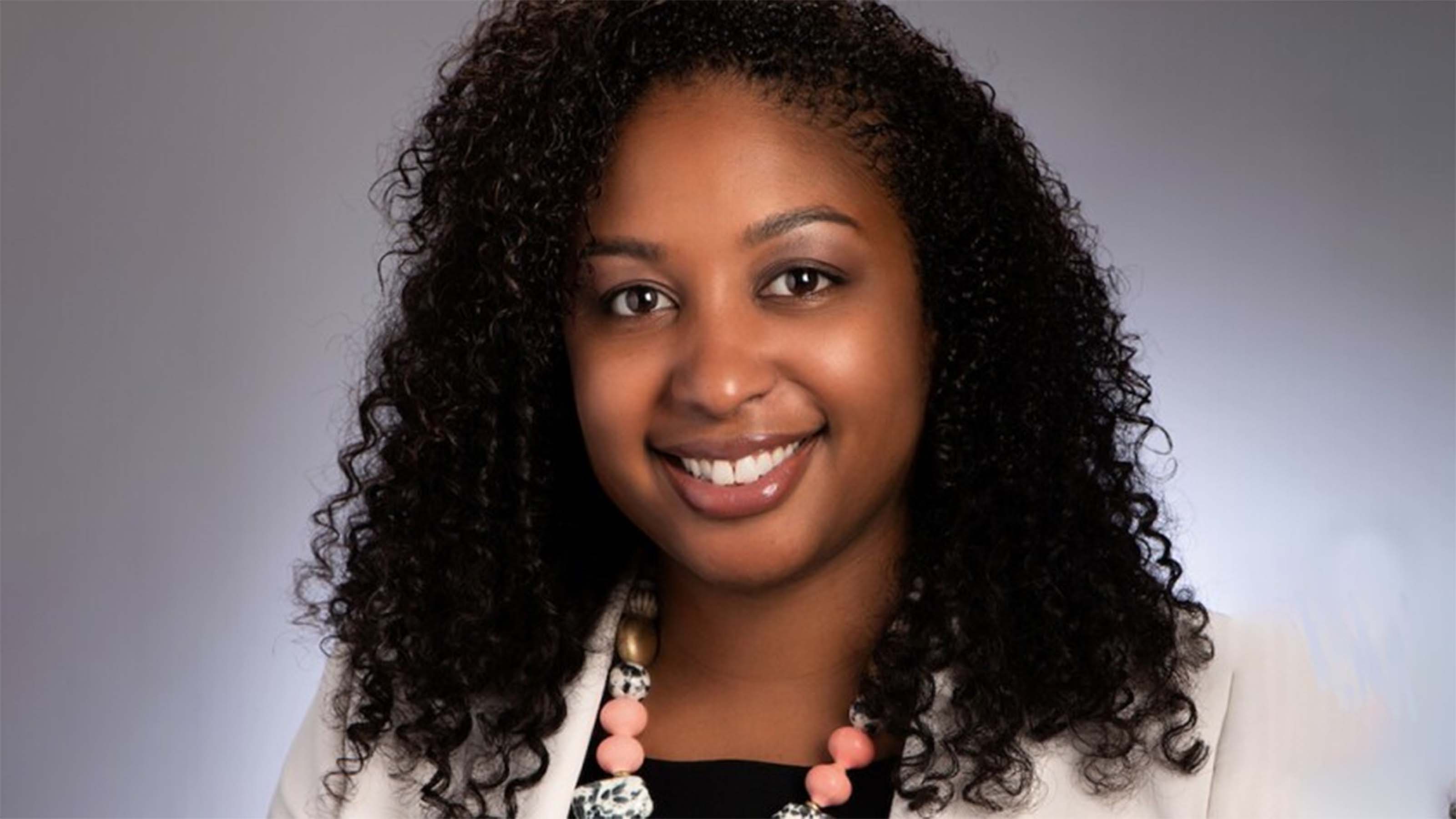PODCAST: The Future of Certified Financial Planners with Kamila Elliott
CFPs will tell you (and we’d agree) that not all financial advice is the same. We talk with the chair of the CFP Board about what she’s doing to preserve her organization’s brand and extend its reach. Also, the right way to file your tax returns for free.

Profit and prosper with the best of Kiplinger's advice on investing, taxes, retirement, personal finance and much more. Delivered daily. Enter your email in the box and click Sign Me Up.
You are now subscribed
Your newsletter sign-up was successful
Want to add more newsletters?

Delivered daily
Kiplinger Today
Profit and prosper with the best of Kiplinger's advice on investing, taxes, retirement, personal finance and much more delivered daily. Smart money moves start here.

Sent five days a week
Kiplinger A Step Ahead
Get practical help to make better financial decisions in your everyday life, from spending to savings on top deals.

Delivered daily
Kiplinger Closing Bell
Get today's biggest financial and investing headlines delivered to your inbox every day the U.S. stock market is open.

Sent twice a week
Kiplinger Adviser Intel
Financial pros across the country share best practices and fresh tactics to preserve and grow your wealth.

Delivered weekly
Kiplinger Tax Tips
Trim your federal and state tax bills with practical tax-planning and tax-cutting strategies.

Sent twice a week
Kiplinger Retirement Tips
Your twice-a-week guide to planning and enjoying a financially secure and richly rewarding retirement

Sent bimonthly.
Kiplinger Adviser Angle
Insights for advisers, wealth managers and other financial professionals.

Sent twice a week
Kiplinger Investing Weekly
Your twice-a-week roundup of promising stocks, funds, companies and industries you should consider, ones you should avoid, and why.

Sent weekly for six weeks
Kiplinger Invest for Retirement
Your step-by-step six-part series on how to invest for retirement, from devising a successful strategy to exactly which investments to choose.
Subscribe FREE wherever you listen:
Apple Podcasts | Google Podcasts | Spotify | Overcast | RSS
Links and resources mentioned in this episode:
- IRS Free File: Do your Taxes for Free
- How to File Your Taxes for Free
- IRS Free File fillable forms
- Extending Financial Planning’s Reach
- About CFP Board: History
- CFP Board: Center for Financial Planning
- PODCAST: Why Pay Money to File Your Taxes?
- Child Tax Credit FAQs for Your 2021 Tax Return
- CFP Board: Kamila Elliott bio
- Foundation for Financial Planning
- The Financial Fiduciary Standard Explained
Transcript:
David Muhlbaum: At Kiplinger, we talk to a lot of Certified Financial Planners. They give us guidance on the best practices they’re using for their clients, and other insights into personal finance. But today, we’re going to talk to the woman who is, in a way, in charge of all of them, and how she’s working to make CFPs a more diverse group. Also, ways to file your taxes for free, all on this episode of Your Money’s Worth. Stick around.
From just $107.88 $24.99 for Kiplinger Personal Finance
Become a smarter, better informed investor. Subscribe from just $107.88 $24.99, plus get up to 4 Special Issues

Sign up for Kiplinger’s Free Newsletters
Profit and prosper with the best of expert advice on investing, taxes, retirement, personal finance and more - straight to your e-mail.
Profit and prosper with the best of expert advice - straight to your e-mail.
David Muhlbaum: Welcome to Your Money’s Worth. I’m kiplinger.com senior editor David Muhlbaum, joined by my cohost, senior editor Sandy Block. How are you doing, Sandy?
Sandy Block: I’m doing great. I’m feeling flush. I just opened a letter from someone who says they’re willing to buy our house as is. And I’m not going to say how much they’re offering, but it was well more than I thought our house was worth, especially given all of the dog hair that is within.
David Muhlbaum: Good for you. But it was an actual someone, like an individual, or an investment fund. Can you tell?
Sandy Block: No, I can’t tell. Actually, it read like a letter from a guy, like a guy named Tom or something. But who knows? Maybe Tom is representing an investment firm. It’s hard to tell who the source is.
David Muhlbaum: That’s interesting for sure. I mean, I get plenty of refi offers, but generally the kind of mail like that, or what you’re talking about, too, it goes right to the recycling bin. So if I got something like that, I probably missed it. But we should get back to this when we talk with contributing writer Daniel Bortz, about home sales, which we’ll do in a couple of weeks. But not right now, because we’re like a month from the April tax filing deadline, so this is probably our last chance to take a swing at taxes. And last year, we did an entire episode on how to file your taxes for free. Good for us. We don’t necessarily have to do that all again, but let’s touch on this question from a 2022 point of view because a few things have changed. Right?
Sandy Block: Right. And the main thing, or one thing, because we really like to encourage people to check out IRS Free File because you really can file for free, your federal taxes, and in some cases, your state taxes too. And this year, in order to use IRS Free File, you need an adjusted gross income of $73,000. That’s up from $72,000 in 2021.
David Muhlbaum: Okay. Well, that’s not exactly keeping up with inflation.
Sandy Block: No. And really, what is? But keep in mind, it’s the adjusted gross income, so it doesn’t mean that you made $73,000 last year, with salary and side hustle or whatever. It’s those things minus things like contributions to an IRA, student loan interest, what we call above the line deductions. But it covers a lot of people.
David Muhlbaum: Okay. I’m going to keep pushing. It’s $73,000 whether you’re single or filing jointly.
Sandy Block: Yes, as far as free file is concerned, the marriage penalty is still in place.
David Muhlbaum: Okay. So it’s $73,000 either way. Okay. Well, all right, and I noticed you were good about the mantra, “IRS Free File” because: those words in that order. I mean, we’re going to link to the IRS Free File site. But Sandy, explain again why say, a conventional web search for filing my taxes for free or something like that, why that’s fraught, what the risks are.
Sandy Block: It’s very fraught because there are a lot of so-called free programs out there from some big names like TurboTax and H&R Block, but they have all these caveats. Even if you think your filing is really simple, just something as simple as making a contribution to a health savings account would bump you up into a paid program. And what really catches people is they’ll start typing in all their numbers thinking they’re going to file for free, and then all of a sudden they find out, no, sorry, you’re going to have to pay 40 bucks.
Sandy Block: IRS Free File, unfortunately, some of the big players have dropped out, but there’s about seven software companies that offer this. They’ll process any return as long as you meet the $73,000 AGI category, no matter how complicated your return is, it will work in free file. So that’s why you really want to go to IRS Free File and not just Google “file my tax for free” because you’ll get all kinds of stuff that way.
David Muhlbaum: Right. And then within that IRS Free File offerings, those offerings you talked about, then there are some differences. Right? Some of them work with, we’ll give you a free state filing, depending. So it pays to look at the details, especially if you are hoping to get a free state filing out of it too.
Sandy Block: Right. You wouldn’t want to go all the way through it thinking you’re getting this great deal and find out it cost you a lot of money to file your state tax return. And the providers that participate are also allowed to define who ... Not everyone can use every program. Some of them will say you have to be a member of the military, or you have to be over 50, or under 50. So you have to sort of do a search and find a program that you qualify for.
David Muhlbaum: Got it. Now there’s another way to slice this. If your income is over that $73,000, there is a way to file for free that’s those free fillable forms on the IRS webpage. That’s like a tongue twister, the free fillable forms. So basically, PDF versions of the various IRS forms, and you could make more than the threshold and file for nothing if you go that route, but you better know what you’re doing.
Sandy Block: Yes. You need to know what you’re doing. All the free file fillable will do is your math. It will do the math for you, but it won’t say, as a typical software program will walk you through and say, “Did you have a home mortgage last year? We think you should take the standard deduction or not.” You’ll get no guidance on free file fillable. It is really just the forms. You fill in the numbers. It does the math. And then you can file electronically when you’re done. But I think this is probably a better option for someone who kind of knows their way around the tax code.
David Muhlbaum: Or there do remain people who, even though you hear from us and from other people time again, file electronically. There are people who simply cannot file electronically, who must file on paper.
Sandy Block: Yes. Most, the majority of tax returns can be filed electronically, but there are some that have to be filed on paper. And I can speak to that personally because when my father passed away last year, I filed a tax return on his behalf. And because I signed it as the executor, obviously he couldn’t, I was required to send it in, to mail it in, paper. That’s the IRS requirement according to the person who prepared the taxes for me. And so, not surprisingly, we still haven’t gotten our refund. Ours is one of the stacks and stacks of tax returns that the IRS hasn’t gotten around to yet.
David Muhlbaum: So how is this filing season shaping up? How are they with electronic or other filings? How’s the IRS doing so far?
Sandy Block: Well, this just in, through February 25th, the IRS says it processed about 44 million individual tax returns. That’s up 11% from the same period last year, so I guess that’s good news. But the really interesting data point I’m writing about for an upcoming issue of Kiplinger’s Personal Finance is that refunds are up. The average tax refund through February 25th was $3,473. That’s up from 15% from the same time last year. Now these comparisons may be imperfect because the tax season got off to a later start last year, and that could affect the numbers. But as you may recall, Congress approved a third round of stimulus checks last year and expanded the child tax credit. So some taxpayers who were eligible for those payments didn’t get them, and they’re able to claim them when they file their tax return, so I think that might be contributing to higher refunds this year. But people are getting more money.
David Muhlbaum: Of their own money back.
Sandy Block: Of their own money back. They’re interest free, and we will discuss this in our upcoming issue as well, why that’s really not a good thing. But no one’s going to turn around, turn away a check from the IRS.
David Muhlbaum: All right. Thank you, Sandy. Coming up in our main segment, we’ll be speaking with the chair of the CFB board about what a Certified Financial Planner actually is, and how she’s working to reshape her organization.
The Future of Certified Financial Planners with Kamila Elliott
David Muhlbaum: Welcome back to Your Money’s Worth. Joining us for our main segment is Kamila Elliott, the chair of the Certified Financial Planner Board of Standards, a nonprofit that establishes and enforces the requirements for the CFP certification. No Board of Standards, no CFPs. No CFPs, well, we’d all probably be a bit worse off when it comes to personal finance. Even if you yourself don’t directly work with a CFP, I think it’s fair to say that their influence is widely felt, and a positive one for people trying to make money, keep their money, and invest their money. So welcome, Kamila, and thank you for joining us.
Kamila Elliott: Hello, and thank you for having me today.
Sandy Block: Thank you, Kamila, for coming on. And listeners should check out my recent Q and A with Kamila in April’s Kiplinger Personal Finance Magazine.
David Muhlbaum: Yeah. We’ll link to your profile, Sandy.
Sandy Block: It wasn’t really a profile. It was more about giving her the chance to talk about her efforts to get more women and minority planners and get more young people into the profession and reach out to more women, minorities, and young people who need financial planning. And she is breaking ground there herself as the first Black CFP board chair.
David Muhlbaum: But not the first woman, right?
Kamila Elliott: Right. I am the first Black woman to serve as chair, but the first woman to hold this role was Donna G. Barwick, from ‘96 to ‘97.
David Muhlbaum: Got it, yeah. In doing a little bit of research for this episode, I looked up some of the history of the CFP board, and I’m going to quote this bit because I saved it. “The financial planning movement experienced a watershed moment on December 12th, 1969 when 13 men gathered in Chicago and outlined the first steps to further the idea that people could benefit from a profession that integrated knowledge and practices across the various areas of financial services industry.” So, that’s like the birth of CFP. But it was kind of striking to look at that and go, “Oh, yeah. 13 men.” That’s what it was. So I guess we have made some progress, or you have.
Kamila Elliott: Yes.
Sandy Block: Industry has.
Kamila Elliott: The industry has, yes.
David Muhlbaum: Well, we do very much want to talk about representation among CFPs and elsewhere. But I want to, as ever, do a bit of definitions first. And I think you’ll welcome this, Kamila, because it will help with the branding. There are a lot of people giving advice about money, and not all of them are Certified Financial Planners. Now I can’t show this in audio, but there’s supposed to be a little registered trademark, you know the R in the circle, after CFP. And we’re expected to capitalize it too, which is the source of some editorial head scratching here from time to time. So, Kamila, what is a CFP?
Kamila Elliott: A CFP professional is an individual who has met the rigorous qualifications for financial planning set by CFP Board. That includes committing to high ethical standards, attain relevant experience, complete the education requirements, and passing the exam.
Sandy Block: And so Kamila, there’s one thing you run into when you’re a writer, financial writer, is that there are tons of acronyms, letters after people’s names, lots and lots of certifications, some hard to get, some I think you just mail away for.
David Muhlbaum: A lot of them start with C.
Sandy Block: So how do you guys sort of distinguish yourself from the many letters and designations that are out there?
Kamila Elliott: So the CFP certification is a standard of excellence for financial planning because CFP professionals have met extensive training and experience requirements, and commit to CFP Board’s ethical standards. Those ethical standards require them to put their clients’ interests first, providing them with confidence today for a more secure tomorrow.
Sandy Block: And just to follow up on that, Kamila, I understand that, I actually know some people and so does David, who have taken the exam to get a CFP. And it’s not easy. I think the pass rate is not great.
David Muhlbaum: 60%, something like that?
Sandy Block: It’s not something you can just take a quick online test and become, correct?
Kamila Elliott: That is correct.
Sandy Block: It’s a difficult certification to obtain.
Kamila Elliott: Yeah. We’re going to discuss this a little bit later. But I spent some time working at a firm that supported RIAs. And when I joined, to your point, there were so many certifications, I couldn’t keep track of them. And at the time, I was a CFP professional, so Sandy, I actually sat one day, I guess I had extra time on my hands, and researched all the certifications and looked into: Is this a certification that requires a two-hour test, and you leave and that’s it? Or is there an education requirement? Is there ongoing continuing education? So a lot of these certifications do vary significantly.
David Muhlbaum: Okay. And about you, so as chair of the Certified Financial Planner Board of Standards, what does the job entail besides talking to us? Are you elected?
Kamila Elliott: I joined the CFP Board on their board of directors in 2019. And to join the board is a self-nominating process. I think the year I applied, there were over 100 nominations and I was lucky to be one of the four that they selected. And then once you join the board, you are then eligible to raise your hand to serve as chair, so I raised my hand to serve as chair in 2020. I was elected by my board of director colleagues to serve, and I began my term in January.
David Muhlbaum: Got it. And you will serve for a year?
Kamila Elliott: Yes. It’s one term.
Sandy Block: So Kamila, in our conversation for the magazine interview, we talked about one of your goals being to increase the number of women and minority planners and attracting more young people to the profession. And I guess my question is: What are you planning to do to try and accomplish that goal?
Kamila Elliott: So one of the things I’m really proud of is that this is not a new goal for the CFP Board. There’s been a lot of focus and attention in this area because we want representation of CFP professionals to mirror the representation or the demographics of the US population. The US population is 13% Black. It is about 16% to 18% Hispanic. And our goal is to ensure that we represent the public in how we serve them and with financial planning. So one of the biggest things that we did was start the Center for Financial Planning in 2015. And part of their role is to focus on the growth of the profession and enhance the level of diversification and support firms to create more inclusion for people of color or those that are historically underrepresented.
Sandy Block: Becoming a CFP isn’t without cost. I think just taking the exam is $1,000. Are some college grads deterred by the cost? And does the board have any plans to address that?
Kamila Elliott: We have multiple scholarships available for CFP certificate education and exams. Just this week, we announced a joint scholarship with the Financial Alliance for Racial Equity, a coalition of leading financial services firms like Nationwide and Morgan Stanley, HBCUs, and leading organizations like DCIIA and the American College of Financial Services. If financing this designation is a challenge, we have a lot of resources available to you.
David Muhlbaum: Yeah. Well, I mean, they’re investing in themselves. I mean, that’s a principle of financial planning right there. But I think perspective matters here. So an amount of money that to a mid-career financial professional, it might sound like a monthly car lease payment, well, that could be the difference between someone entering this career path or not. So, $1,000 can matter.
Kamila Elliott: It does matter. But one thing I’m excited about is that there is demand for financial planners ... or I would say CFP professionals. We expect a 5% growth in this profession from now until 2030. As you probably know, a lot of large firms are specifically asking for CFP professionals to support their clients with holistic investment advice and financial planning. So to your point, David, it is an investment in yourself and it’s an investment in a very rewarding and growing profession.
David Muhlbaum: Yeah. That’s interesting you raised the question of who is employing and where the CFPs are in demand. And this is something I was thinking also, I mean, the ecosystem of financial advice, and I’m speaking broadly here, not just how it applies to CFPs, it’s increasingly tied to big firms and platforms. Kamila, you yourself worked for Vanguard for many years. So I’m thinking often it’s going to be a trading platform or a custodian that provides the gateway to a financial professional. So this is a bit of an inside industry question. But the CFP Board, you have a constituency that includes both individual operators, people with their shingle out, and probably a lot of people who are corporate employees. Can you talk about that dynamic at all?
Kamila Elliott: It is. And David, I have been in all of those. Right? I started working at Vanguard, which is a large retail organization. And then I spent some time working at a broker dealer. And then now I’m the CEO and founder of Collective Wealth Partners, which is an RIA. So working in all those different segments, I really appreciate some of the opportunities that the CFP Board has in helping these organizations support their CFP professionals, support the growth of the profession, and also the innovation that’s continuously happening within the profession. And how do we make sure that our standards and competencies continually address those challenges they have?
Sandy Block: So Kamila, I’d like to switch this conversation to the people who invest and may consult with a financial planner. In the past couple of years, we’ve seen a lot of young people entering the stock market. They’re new investors. You can invest with an app from Robinhood, that sort of thing. And they’re in turn using their existing information channels like Reddit, TikTok, for financial guidance. How do CFPs reach them? And how do you say that maybe relying on information you get on the internet is not necessarily the best way to develop a financial plan?
Kamila Elliott: And all these forums, you don’t see much conversation about short-term and long-term capital gains rates, or you don’t see conversations about whether you have the right estate plan. And we’re happy that people are talking about investing, but they often need professional help. This is true when you’re just talking about or just starting out, and you also want to gain more assets, which adds a level of complexity. But just as you see a doctor so you can have better health, if you’re working with a CFP professional, you’ll have better financial health. It’s a more holistic approach to improving your finances besides just picking or helping you choose a couple of stocks here or there.
Sandy Block: What can the financial planning industry do to reach out to people who need advice but don’t have a lot of money to manage? I’ve seen in my experience, I’ll talk to planners and they seem really great. And friends of mine will ask me for a referral. But a lot of the planners I know won’t even take your business if you have less than $1 million in assets. And that excludes a whole lot of people. So what are you doing to try and reach out to folks who need advice, but don’t have a lot of assets to manage?
Kamila Elliott: That’s a great question. And I would say we’re looking to address it in a couple of ways. One, as the CFB Board, we’re always evaluating pro bono financial planning for those that are underrepresented. The Foundation for Financial Planning was one of our key partners in offering services to those that historically have been excluded from larger firms. But Sandy, to your friends that may not fit the underrepresented, but just they’re in that spot where they’re not quite the ideal client for some firms, is focusing on more innovation and technology. And how can we provide financial advice, or support the delivery of financial advice, to scale, to ensure that these larger firms will welcome these clients and give them the support that they really need to reach their long-term goals?
David Muhlbaum: Kamila, I knew that you’d worked for Vanguard and that you had your own firm now. And you mentioned having worked for a broker-dealer. But can you tell me a little bit more about your path to where you are today and how that informs what you’re trying to do with the CFP Board?
Kamila Elliott: Sure. My path is very untraditional. I grew up in a single parent household where no one in my family had a financial advisor. I did not know what a financial advisor was until I went to college. I just ended up working at a job part-time and learned more about investments and started reading. And to your point, my first job out of undergrad was working at Vanguard, talking to participants in 401(k) plans. And so it wasn’t a concerted effort where, Sandy and David, I woke up at 10 years old, I want to be a financial planner. It really evolved over time. And I’m really proud of that story. It’s because I feel that many people like myself, young, Black women, just don’t have exposure to this industry.
And I think there’s importance in displaying. One of the things I always say is, “This is an industry where you can do good for yourself and do good for others.” And how do we articulate that message for a lot of people that when you’re looking for a career that marries maybe a love of investments, a love of talking to people and helping people? The financial planning career is something you should definitely be looking into.
David Muhlbaum: Just one little curiosity detail because you mentioned having grown up not knowing what a financial advisor was, and then working for Vanguard. Can you explain how those two came together? Because in part because Vanguard is a name that we live and breathe all the time here on the inside of the industry. Were they doing outreach? How did you get to them?
Kamila Elliott: No. So this is a comment that will age myself, David. I am from Philadelphia, and Vanguard is in Malvern, which is outside of Philadelphia.
Sandy Block: Valley Forge.
Kamila Elliott: I was reading the newspaper, and I saw that Vanguard was hiring. I was home for the weekend.
David Muhlbaum: Yay, a traditional media moment.
Kamila Elliott: Exactly, exactly. And I drove to the Malvern office. They had an all-day career fair, where they were interviewing people on the spot. This was during the 2000 tech emergence, and the stock market was doing really, really great. And they were hiring a great deal of new people. And that’s how I ended up at Vanguard. They said, “Do you have an interest in investments? Do you like talking to people?” Yes and yes. Come join us.
David Muhlbaum: That’s great. Well, I think all our Bogleheads will appreciate that.
Kamila Elliott: Yes, they will. Yes, they will.
Sandy Block: Kamila, you talked about the ability to do good for yourself and do good for others. And I think that’s a good segue to asking you about the fiduciary standard. I believe that all CFPs now are required to adhere to the fiduciary standard. And I wondered if you could explain that, and why that’s important.
Kamila Elliott: It is very important that all CFP professionals adhere to the fiduciary standard. When I think about my profession and what we do, people entrust their entire life’s worth and assets with us, and help them reach their long-term goals. And it’s really important that as CFP professionals, when we’re providing recommendations, when we’re sharing different investments, that we put the clients’ interests first, above our interests financially, and that we continuously provide support and resources for CFP professionals to make the right recommendations and to provide holistic planning and support.
One of the things that I ... In our profession, only about a third of all financial advisors are CFP professionals. And unfortunately, many people in the public may not have had the best experience with a financial professional because they were not a fiduciary. Our goal is to ensure that more and more people or CFP professionals adhere to the fiduciary standard and really uphold our profession and make it a very respectable profession because we do hold our individuals to high ethical standards and integrity.
David Muhlbaum: Okay, Kamila, this may be an elusive metric, but are there connections between stock market performance and the number of people seeking guidance from CFPs, for example? On one hand, there is this dynamic where people come to CFPs when they’ve made money. On the other hand, losing money or maybe just greater volatility probably leads to people freaking out, no, no, seeking more professional guidance. Is this a dynamic in the field?
Kamila Elliott: Yeah. People often turn to CFP professionals during pivotal moments, whether it be a global event like the pandemic, or key life moments like having their first child. So CFP professionals establish, we work with clients to help them whether life’s ups and downs, and while we do not have metrics to support the volatility point you made, David, I can share anecdotally that myself and almost every colleague experienced an uptick in inquiries during the pandemic. The uncertainty led to an increased demand for professional advice, and something CFP professionals are uniquely qualified to provide.
Sandy Block: So we’re talking to you at a time when the market is extremely volatile. There’s enormous ... We’re sort of coming out of the pandemic, but now we’ve got geopolitical events, oil prices are rising. My husband commented yesterday-
David Muhlbaum: There’s a war on.
Sandy Block: There’s a war on. Gas prices are soaring. And that makes people nervous. So I guess maybe to wrap up, what’s your advice to people right now who are perhaps spending a lot of time looking at their 401(k) and seeing on a particular day that they’ve lost a lot of money, or spending a lot of time watching the news? What should they do?
Kamila Elliott: One of the things I tell my clients, Sandy, is yes, there’s a lot of things happening. Right? There’s war. There’s increased prices. But I go back to the person. What has changed with you? You changing in terms of maybe your income, your goals, are usually the biggest predictor of making changes to your portfolio or making moves. There’s always going to be an event. Right? I mean, think about the past five years. Right? We also have a global pandemic. We had a lot of racial injustice and protests. I mean, there’s been a litany of events that have happened over the past five years that could make anyone’s head spin, and have created a lot of volatility in the market.
And if you reacted to every single event that happened, you wouldn’t be able to do what you do full-time, focus on your family, and on all of your other priorities. So my advice to people is, if you have any concerns about the market, work with your CFP professional, I hope. Work with your financial advisor. And they can help you understand how these events may impact you, or not impact you. But sometimes I say it’s important to turn the TV off every once in a while, or close that laptop down because all the noise in the markets can really be frightening and alerting for people. But it always is not necessary.
David Muhlbaum: Well, thank you very much. We’re hoping that people will now reach the end of our podcast and have a moment of zen to reflect on all those things. And we wish you lots of luck in your term achieving these goals that you’ve outlined for us. Thank you so much, Kamila.
Kamila Elliott: Thank you so much.
Sandy Block: Thank you.
Kamila Elliott: Thank you for having me.
David Muhlbaum: That will just about do it for this episode of Your Money’s Worth. If you like what you heard, please sign up for more at Apple Podcasts, or wherever you get your content. When you do, please give us a rating and review. And if you’ve already subscribed, thanks. Please go back and add a rating and review if you hadn’t already. To see the links we’ve mentioned in our show, along with other great Kiplinger content on the topics we’ve discussed, go to kiplinger.com/podcast. The episodes, transcripts, and links are all in there by date. And if you’re still here because you want to give us a piece of your mind, you can stay connected with us on Twitter, Facebook, Instagram, or by emailing us directly at podcast@kiplinger.com. Thanks for listening.
Profit and prosper with the best of Kiplinger's advice on investing, taxes, retirement, personal finance and much more. Delivered daily. Enter your email in the box and click Sign Me Up.

In his former role as Senior Online Editor, David edited and wrote a wide range of content for Kiplinger.com. With more than 20 years of experience with Kiplinger, David worked on numerous Kiplinger publications, including The Kiplinger Letter and Kiplinger’s Personal Finance magazine. He co-hosted Your Money's Worth, Kiplinger's podcast and helped develop the Economic Forecasts feature.
-
 Ask the Tax Editor: Federal Income Tax Deductions
Ask the Tax Editor: Federal Income Tax DeductionsAsk the Editor In this week's Ask the Editor Q&A, Joy Taylor answers questions on federal income tax deductions
-
 States With No-Fault Car Insurance Laws (and How No-Fault Car Insurance Works)
States With No-Fault Car Insurance Laws (and How No-Fault Car Insurance Works)A breakdown of the confusing rules around no-fault car insurance in every state where it exists.
-
 Why Picking a Retirement Age Feels Impossible (and How to Finally Decide)
Why Picking a Retirement Age Feels Impossible (and How to Finally Decide)Struggling with picking a date? Experts explain how to get out of your head and retire on your own terms.
-
 The Most Tax-Friendly States for Investing in 2025 (Hint: There Are Two)
The Most Tax-Friendly States for Investing in 2025 (Hint: There Are Two)State Taxes Living in one of these places could lower your 2025 investment taxes — especially if you invest in real estate.
-
 Bond Basics: Zero-Coupon Bonds
Bond Basics: Zero-Coupon Bondsinvesting These investments are attractive only to a select few. Find out if they're right for you.
-
 Bond Basics: How to Reduce the Risks
Bond Basics: How to Reduce the Risksinvesting Bonds have risks you won't find in other types of investments. Find out how to spot risky bonds and how to avoid them.
-
 What's the Difference Between a Bond's Price and Value?
What's the Difference Between a Bond's Price and Value?bonds Bonds are complex. Learning about how to trade them is as important as why to trade them.
-
 Bond Basics: U.S. Agency Bonds
Bond Basics: U.S. Agency Bondsinvesting These investments are close enough to government bonds in terms of safety, but make sure you're aware of the risks.
-
 Bond Ratings and What They Mean
Bond Ratings and What They Meaninvesting Bond ratings measure the creditworthiness of your bond issuer. Understanding bond ratings can help you limit your risk and maximize your yield.
-
 Bond Basics: U.S. Savings Bonds
Bond Basics: U.S. Savings Bondsinvesting U.S. savings bonds are a tax-advantaged way to save for higher education.
-
 Bond Basics: Treasuries
Bond Basics: Treasuriesinvesting Understand the different types of U.S. treasuries and how they work.

